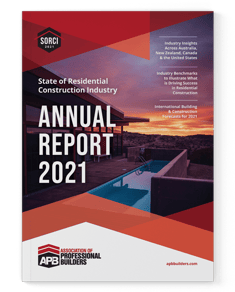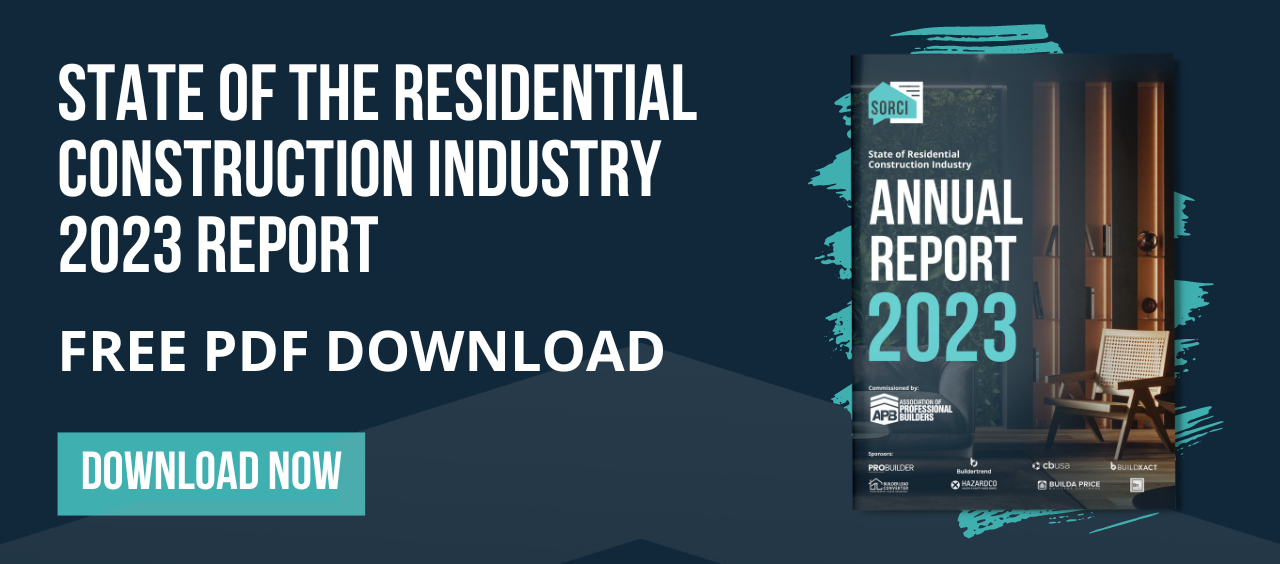What’s changing in residential construction in 2021?
In quarter four of 2020, the Association of Professional Builders commissioned a comprehensive survey report covering the State of Residential Construction Industry (SORCI).
Over 1,000 residential building companies across the United States, Australia, Canada and New Zealand took part in the survey revealing detailed information on their marketing, sales, operations and financial performance.
The intention behind such a mammoth operation was to gather a deeper insight into the residential construction industry and spot emerging trends in an effort to help improve the industry for both builders and consumers.
The residential building industry faced a challenging year in 2020 due to the COVID-19 pandemic.
Many industries struggled as government authorities issued health directives that enforced social distancing restrictions and lockdowns to reduce a spike in infections which would cause strain on hospitals and healthcare providers.
Because of this, these health restrictions forced many businesses to close causing an increase in unemployment.
In response, many government authorities introduced stimulus packages to soften the economic impact, which had a surprising effect on the residential building market.
Consumers who remained employed had less options for spending money as overseas travel no longer became an option.
As a result, consumers were making decisions faster and investing disposable incomes in property.
 Unexpectedly, in the early stages of initial lockdowns, the industry saw record levels of preliminary building agreement (PBA) sign-ups.
Unexpectedly, in the early stages of initial lockdowns, the industry saw record levels of preliminary building agreement (PBA) sign-ups.
This resulted in residential builders experiencing increases in both revenue and net profit and up to five times higher overall results for quarter four of 2020.
The world is currently in the middle of the COVID-19 pandemic but the projections for 2021 are very positive.
Analysis of the data illustrates that 46.5% of builders signed more contracts in 2020 compared to 2019.
These results show the progress the industry is making in forward planning and the concentration of efforts in net profit increases.
However, despite the increases in contract signings, the impact of COVID-19 still cannot be predicted.
Government stimulus packages have already started to expire which is expected to cause severe cash flow difficulties for builders as current construction projects come to an end.
Predictions for 2022 aren’t quite as positive and analysis reveals a need for residential builders to take action to stay ahead of competitors and avoid having to drop their margins.
It is expected that the long term economic impact of the COVID-19 pandemic is likely to be significant to the residential building industry.
However, trends indicate that builders are already making preparations this year in order to survive the predicted downturn in 2022.
Systemising Building Companies
The #1 goal for builders in 2021 is to systemise their building companies.
Analysis of the data gathered in the SORCI survey uncovered that 39.1% of builders feel the need to systemise their building companies in the year 2021.
This is promising information that indicates many builders have a good understanding that systemisation is the key to growing and scaling their businesses profitably.
Lack Of Effective Business Planning
 Arguably one of the most concerning trends that has been uncovered in this report is the lack of effective business planning in a large portion of residential building companies that were surveyed.
Arguably one of the most concerning trends that has been uncovered in this report is the lack of effective business planning in a large portion of residential building companies that were surveyed.
More specifically, analysis of the data has revealed that very few builders have future- proofed their businesses with a staggering 78.8% of respondents disclosing that they do not have a succession plan.
As with any business in any industry or sector, this is a considerable risk management issue that can cause significant harm to the value of the business.
Not to mention the disruption that is often created if a person in a leadership position exits the company.
Loss of experience and knowledge can cause substantial gaps in the business and its day-to-day operations.
Common Building Company Issues And Challenges
As is often the case, many builders start off as a small business and do not frequently envision themselves retiring or leaving their businesses.
The crucial component that is frequently overlooked is that a lack of planning is an essential factor in creating more freedom in the business.
As with many building companies, employing staff or contractors is a necessary part of keeping the wheels turning, however a large portion of respondents stated a lack of competent and reliable staff as one of their biggest issues.
Creating clarity and outlining expectations for team members to promote an understanding of their duties and responsibilities is a key component to effective planning, however this report has uncovered that 82.1% of respondents do not have written job descriptions for their staff.
Vulnerability To Hidden Liabilities
Despite the COVID-19 pandemic in 2020, 46.5% of respondents signed more contracts in 2020 than in 2019.
Although this is a promising and unexpected outcome during uncertain times, 49.5% of the respondents stated that they never calculate their work in progress figure.
This creates a significant risk in builders growing too quickly without understanding their true financial position and increasing the likelihood that those builders who do not perform this calculation regularly will pay too much tax and experience severe cash flow problems, particularly when sales reduce in an expected downturn predicted for 2022.
To discover all the details of what is happening in our industry and benchmark your building company against professional builders around the world, order your copy of the State Of Residential Construction Industry 2021 Report today!


.png)



